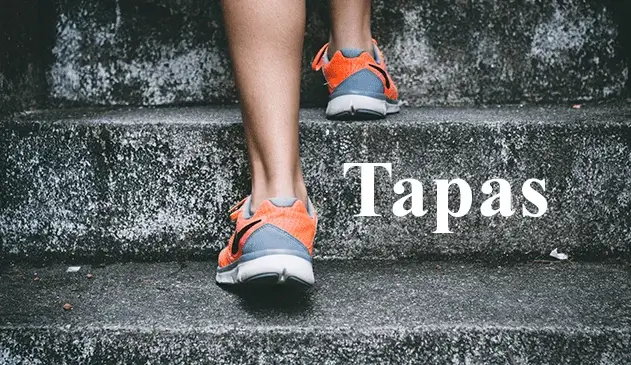This article includes a short introduction to the concept of Tapas + journal prompts + practical and easy ways to incorporate the concept into your life.
NOTE If you just landed on this article be sure to read the first article in this series first:
“What can an ancient text called the Yoga Sutra do for you?”
NIYAMAS – The inner ethical rules.
(Yoga Sutra II.32)
Niyamas is the second limb in the 8 limbs of Astanga Yoga. Ni means inwards or within and Yamas means restraint = as in holding back or trying to stop doing.
The Niyamas are 5 ethical principles for moral conduct and for how you treat yourself. They focus on daily activities, actions, attitudes, and communication. By working with the 5 principles, you work with the areas that can contribute to increasing your sense of joy and happiness.
The 5 principles are: cleanliness (saucha), contentment (santosha), discipline (tapas), self-study (swadhyaya) and surrender (ishvara pranidhana).
The principles of internal awareness and attention are suggestions for relating to yourself. The purpose is to create a healthy inner environment that will help you live a life of the highest quality and achieve your potential. By trying to live by them, you are helping to pave the way for personal growth.

Tapas – dedication, the third Niyamas.
(Yoga Sutra II 43)
Tapas is the third Niyamas, and is all about maintaining discipline to achieve your goals.
Tapas is one of the key concepts in the philosophy of yoga. The root of the Sanskrit word “tap” which means “to burn.” The essence of Tapas is the idea of purification through disciplined practice and the burning away of impurities.
Tapas involves a willingness to endure some discomfort for the sake of spiritual growth. This concept encourages you to embrace challenges, both physical and mental, as opportunities for transformation and self-improvement.
Tapas refers to the ability to maintain a disciplined effort required to achieve anything in life extends beyond the practice of yoga into how you approach daily challenges, and emphasizes the importance of perseverance, integrity, and commitment to personal growth.
It is about cultivating a strong will and a fiery passion for personal transformation. It teaches that through disciplined practice and perseverance, you can overcome obstacles, purify the body and mind, and move closer to realizing your highest potential.
The heat generated by a Tapas practice (think physical practice and the internal body heat) is believed to illuminate the inner light of awareness and burn away the ego, leading to a deeper connection with the self and the divine.
Practical steps when working with Tapas.
Applying Tapas to the practice of yoga and any kind of physical exercise.
- Accept the concept of discipline and commitment in your training.
- Prioritize your commitment to the practice over other distractions.
- Take the time to learn the discipline of yoga thoroughly.
- Regularly engage in yoga or other forms of physical exercise.
- When things are challenging listen to your body but continue to play on the edge of your abilities.
- Be willing to learn the (fundamental) techniques of your practice.
- Don’t jump from teacher to teacher but find a teacher or coach and stick with that coach and learn all that they can teach.
Applying Tapas to your life.
- Commit to practices that enhance your focus and mental clarity like meditation and breathing exercises.
- In moments of stress or distraction come back to your breath.
- Practicing patience, tolerance, and compassion in difficult situations or relationships.
- Don’t shy away from challenges but work with your discomfort to find growth and understanding.
- Maintain a commitment to your (spiritual) practices and beliefs, even in the face of doubt or societal pressures.
- Don’t overdo it, but balance self-discipline with self-compassion.

Important self-investigation.
Tapas is the disciplined use of effort. It is about focusing your efforts on achieving your goals. So, if you’re trying to eat cleaner, you can practice tapas by being disciplined and bringing your lunch to work, rather than buying from a fast-food restaurant.
Implementing discipline helps you to push a little harder so that you can create the changes that are necessary in your life. Upholding discipline is very much necessary to achieve what you want in life and is related to your ability to create changes in your life.
You are not seeking to be a fine caterpillar, but a beautiful butterfly, so you will need the discomfort of discipline to go through this transformation. Practicing being responsible to yourself, and your life choices will allow you to do the work needed for transformation.
When things get challenging, it is not a movie or a glass of wine time, it is time to stay, continue, and find forces inside yourself. Don’t try to escape the work that needs to be done. When things feel difficult, you can turn up the heat or you can escape, the outcome for these two options looks very different down the road.
Consider if there is anywhere where you’re missing an opportunity to practice more Tapas. Notice where you are resisting applying discipline in your life? Is the discipline you are currently upholding supporting your core values? And where in your life will incorporating discipline right now make the biggest impact?
Remember to recognize and accept your current limitations, whether they are physical, emotional, or mental. Tapas isn’t about pushing beyond your limits to the point of harm but gradually expanding them through mindful effort.
Contemplation and Journal prompts on Tapas.
- What does the concept of Tapas mean to you?
- Where in your life do you already practice discipline and self-control?
- What specific discipline or practice do you want to focus on to cultivate Tapas? Why is this important to you?
- What small, actionable steps can you take to incorporate this discipline into your daily life?
- How would your life change if you successfully incorporated this discipline? How will it affect your mental,
- physical, and spiritual well-being?
- What are the biggest challenges you face in maintaining discipline? How can you address these challenges in a healthy and constructive way?
- How can you balance self-discipline with self-compassion? How does being kind to yourself support a practice of discipline?
- In what areas of your life could you apply Tapas more effectively?
- How can you ensure that maintaining discipline remains a central part of your journey?
- Are there specific habits you can form that embody this concept?
Ready to take the next step – Swadhyaya!






